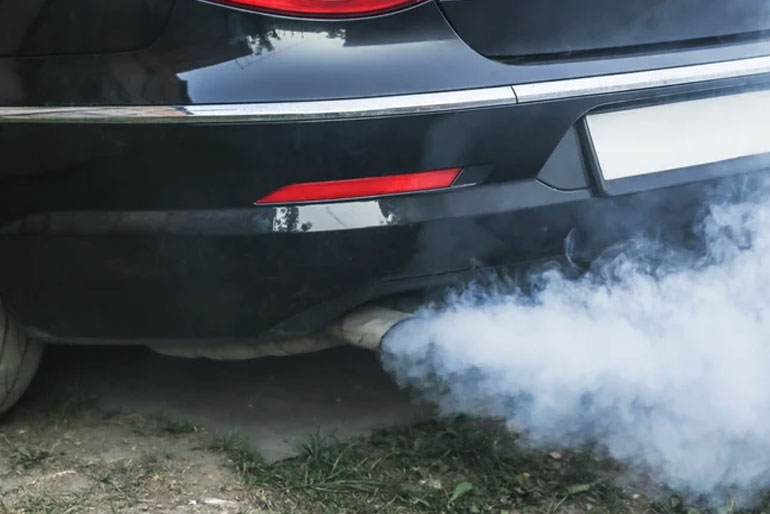Seeing white smoke billowing from your car’s exhaust can be concerning. Whether you’re a seasoned driver or new to the road, understanding what this means and how to address it is crucial. Let’s break it down in simple terms, so you know what to look for and how to fix it.
What Causes White Smoke from the Exhaust?
White smoke from the exhaust can signal different issues, some more serious than others. Here are the most common causes:
- Condensation: On chilly mornings, seeing white smoke is often just condensation. This is usually harmless and should disappear once the engine warms up.
- Coolant Leak: If the white smoke persists, it might indicate a coolant leak. This happens when coolant enters the combustion chamber and burns, producing white smoke.
- Fuel Injector Problems: Faulty fuel injectors can lead to unburned fuel in the exhaust, causing white smoke. This is more common in diesel engines.
- Blown Head Gasket: A blown head gasket can allow coolant to mix with engine oil or enter the combustion chamber, resulting in white smoke. This is a serious issue that needs immediate attention.
- Cracked Engine Block or Cylinder Head: Cracks in these components can lead to coolant leaks, causing white smoke. This typically requires significant repairs.
How to Diagnose the Issue
Before jumping to conclusions, follow these steps to diagnose the problem:
- Observe the Smoke: Note when the smoke appears. Is it only during startup, or does it continue while driving? Is the smoke thick or thin?
- Check Coolant Levels: A drop in coolant levels without visible leaks might indicate an internal leak.
- Examine Oil Condition: Milky oil on the dipstick could signal coolant mixing with oil, indicating a blown head gasket.
- Inspect for Leaks: Look for coolant leaks under the car or around the engine bay.
- Use Diagnostic Tools: An OBD-II scanner can help identify engine problems by reading error codes.
How to Fix the Problem
Once you’ve diagnosed the issue, here’s how to fix it:
- Condensation: If it’s just condensation, there’s no need to worry. The smoke should stop once the engine is warm.
- Coolant Leak: For minor leaks, you can use a radiator sealant as a temporary fix. However, it’s best to have a professional repair the leak to prevent further damage.
- Fuel Injector Problems: Cleaning or replacing the fuel injectors can resolve this issue. Adding a fuel injector cleaner to your fuel tank might also help.
- Blown Head Gasket: Replacing a blown head gasket is a complex job best left to professionals. Ignoring this issue can lead to severe engine damage.
- Cracked Engine Block or Cylinder Head: Repairs for these issues can be costly and involve either welding the cracks or replacing the damaged parts.
Preventing White Smoke Issues
Prevention is always better than cure. Here are some tips to keep your engine running smoothly and avoid white smoke issues:
- Regular Maintenance: Stick to your vehicle’s maintenance schedule. Regular oil changes, coolant checks, and tune-ups can prevent many issues.
- Monitor Fluid Levels: Regularly check your coolant and oil levels. Promptly address any drops or leaks.
- Use Quality Fluids: Always use the manufacturer-recommended fluids. Cheap or incorrect fluids can cause damage.
- Drive Sensibly: Avoid harsh driving habits like sudden acceleration and heavy braking. These can put extra stress on the engine and its components.
- Address Issues Promptly: If you notice any signs of trouble, such as white smoke, unusual noises, or performance issues, have your vehicle checked by a professional right away.
When to Seek Professional Help
While some minor issues can be fixed at home, others require professional expertise. Here’s when you should definitely see a mechanic:
- Persistent White Smoke: If the white smoke doesn’t go away after a few minutes of driving, it’s time to see a mechanic.
- Coolant in Oil: Milky oil indicates a serious problem that needs immediate attention.
- Overheating Engine: If your engine overheats, it can lead to severe damage. White smoke can be a sign of overheating issues.
- Loss of Power: If your vehicle loses power along with white smoke, it could be a sign of a serious engine problem.
- Strange Noises: Knocking, ticking, or other unusual noises combined with white smoke should not be ignored.
Conclusion
White smoke from your exhaust can be alarming, but understanding its causes and solutions can help you address the issue promptly. Regular maintenance and attention to your vehicle’s performance can prevent many problems. If in doubt, don’t hesitate to seek professional help to keep your car running smoothly and safely.







